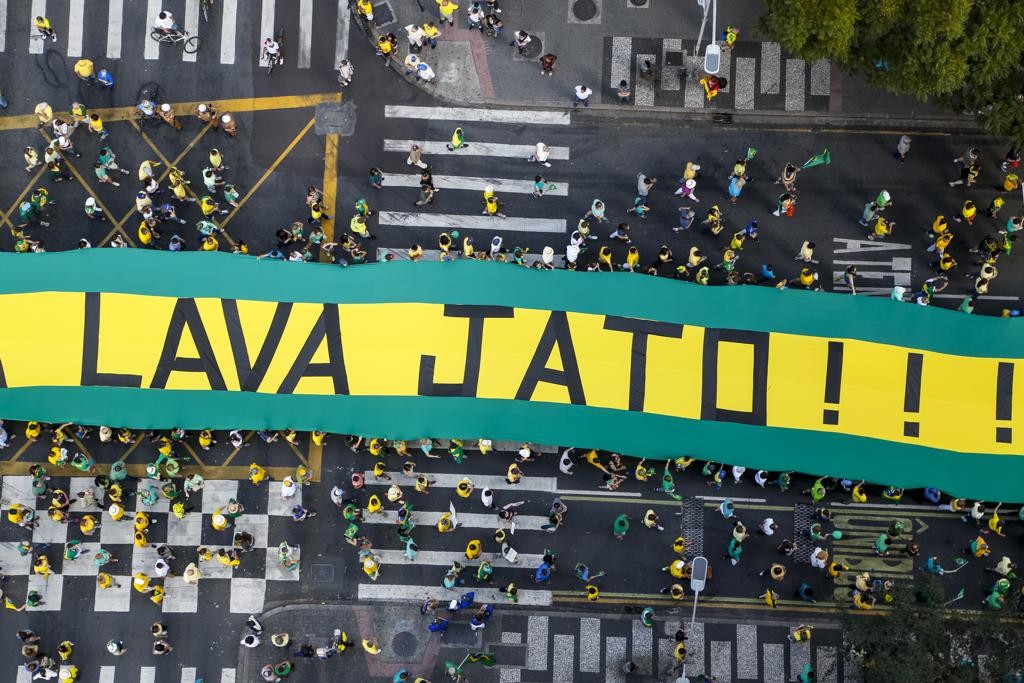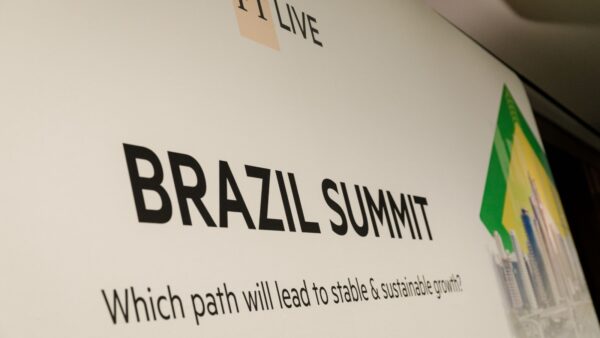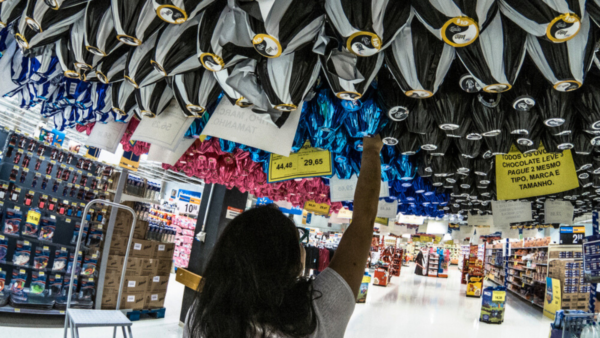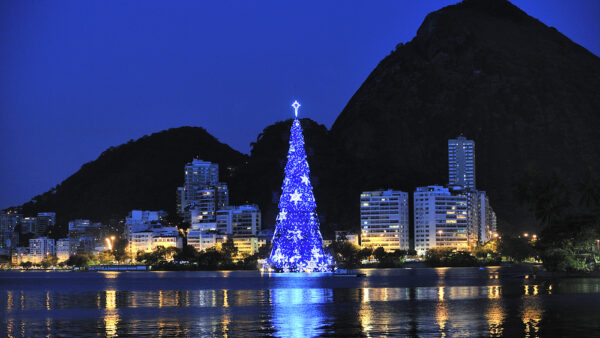Early in the morning on March 17, 2014, federal marshals launched the so-called Operation Car Wash. A group of detectives had been investigating a gang that had used a gas station just three kilometers away from Congress as a front for money laundering schemes. But what began as a small, unpublicized operation would later evolve into Brazil’s biggest-ever corruption scandal – which has so far implicated 1,203 people, including every single major political party, the country’s most popular politician, and the sitting President of the Republic.
Operation Car Wash has put the Federal Prosecution Office at odds with the presidency and Congress. And as with anything connected to politics in our current climate, it has also divided Brazilian society. Between hits and misses, the operation has served to expose how deeply corruption runs in Brazilian public administrations. And the picture is by no means a pretty one.
Everything about Operation Car Wash is superlative. The schemes investigated were carried out in Brazil’s largest company, the state-owned oil & gas firm Petrobras. The amount of data compiled through 45 stages (so far) has forced the Federal Police to create a new system to store everything. The money siphoned by politicians and former Petrobras executives amounts to a staggering BRL 8 trillion – and that’s just the number so far. For the sake of comparison, Brazil’s 2015 GDP was only BRL 5.9 trillion.
The corruption scheme within Petrobras was so massive that it led The Guardian to question if it might be the biggest scandal in history.

From gas stations to the presidency
Police first focused their efforts on investigating the doleiros, people responsible for laundering money from corruption schemes. The operation’s first target was Alberto Youssef – a known criminal who operated shady schemes for corrupt businessmen and politicians. He was known to authorities, as he had been arrested seven times prior to the Car Wash scandal.
The Feds soon realized that he operated an illegal financing scheme for the right-wing Progressive Party, a member of the presidential coalition. Soon, however, the investigators would hit jackpot. They found receipts linking the purchase of a USD 110,000 Range Rover to Paulo Roberto Costa, a former director at Petrobras. It was the thread that led to a far wider – and seemingly endless – anti-corruption investigation.
In 2014, Youssef signed a plea deal with federal prosecutors, promising to assist with the investigation. He detailed the path of the money from Petrobras to the pockets of politicians. On numerous occasions, Youssef delivered the money personally. He provided evidence that led to the prosecution of politicians, executives of construction companies, and more doleiros. Youssef was also the first to connect former House Speaker Eduardo Cunha to corruption and money laundering activities.
Youssef was sentenced to 102 years in prison, but was released after serving just three of them because of his collaboration with the investigation.
Taking down the government
While former President Dilma Rousseff has not been personally involved in any wrongdoing, the popularity of her administration took an enormous hit with the Petrobras scandal. The 2014 election was supposed to be a one-horse race leading her to a second term. Instead, it became the closest election in Brazilian history, with Rousseff winning the runoff stage by a margin of less than 3 percent of votes.
Rousseff’s second term was tumultuous, to say the very least. The corruption scandal added fuel to a fire of public revolt caused by the biggest recession in the country’s history. The President’s relationship with the political establishment had also soured. Without popular support and loathed by Congress, she was left vulnerable to groups that wanted her out of the presidency.
These groups, led by former House Speaker Eduardo Cunha and then-Vice-President Michel Temer, used an accusation of doctoring the budget to push for Rousseff’s impeachment. In an ironic turn of events however, her replacement, Michel Temer, now sees himself at odds with Operation Car Wash.
In May 2017, Temer was secretly taped by a business mogul discussing payments of hush money to Eduardo Cunha – who has been under police custody since 2016. Temer was also accused of taking bribes in exchange for passing pieces of legislation that favored private companies. But Temer has not (yet) lost the support of Congress in the way that Rousseff did, and seems to be headed safely towards carrying out his term through December 2017.
A new paradigm
Brazil’s problematic relationship between what’s private and what’s public has always been an issue. The political scene is particularly vulnerable to corruption. With a system that leads to fragmentation, governments often see themselves as needing to buy political support in order to pass legislation. That’s why allies are always fighting for the right to nominate directors to state-owned firms: through kickbacks and bribery schemes, they will be the source of profit.
Many investigations in the past have tried to unveil corruption schemes, but were annulled due to procedural mishaps. That wasn’t the case with Operation Car Wash. In more than a few ways, this investigation has been groundbreaking. For the first time in Brazilian history, we’re seeing the elite sectors of society being sent to prison – and staying there. The operation has arrested dozens of billionaire businessmen who had paid bribes to public figures for decades. So far, 107 people have been convicted of crimes with sentences that amount to a combined 1,634 years in prison.
The investigation has also led to the first arrest of a Senator during democratic times. In November 2015, former Senator Delcídio do Amaral (who has since been impeached) attempted to pay USD 75,500 for the silence of Nestor Cerveró, the former director of Petrobras’s international operations. He signed a plea deal with the Federal Prosecutor’s Office, and insisted that he had always acted on the behalf of Lula.
Further investigations, however, cleared Lula, stating that there wasn’t any evidence to corroborate Amaral’s words.
The Janot lists
Between 2015 and 2017, former Prosecutor General Rodrigo Janot published two lists of corrupt politicians. The first list came about in March 2015, just as Dilma Rousseff was entering her second presidential term. In the second document, Janot asked the Supreme Court to investigate 83 high-profile politicians.
“Janot’s List” is a result of the plea deal signed by 77 former Odebrecht executives last year. Now that Janot approved the investigations, the next step is for the Supreme Federal Court (STF) to approve them. If the justices approve the investigations, the accused politicians will become criminal defendants. The STF approved all 28 investigations against 48 authorities on Janot’s first list.
Here are the most important names on “Janot’s List”:
- Former Presidents Lula da Silva and Dilma Rousseff;
- House Speaker Rodrigo Maia;
- Senate President Eunício Oliveira;
- Cabinet Members: Aloysio Nunes (Foreign Affairs), Eliseu Padilha (Chief of Staff), Moreira Franco (Secretary General), Bruno Araujo (Cities), Gilberto Kassab (Communications).
Moro v. Lula
Operation Car Wash has also pitted two very popular – and polarizing – figures against one another: Federal Judge Sérgio Moro and former President Luiz Inácio Lula da Silva.
The former President has been prosecuted in four different cases connected to Operation Car Wash. On July 12, 2017, Moro convicted Lula for corruption and money laundering, sentencing him to 9 years and 6 months in prison. In addition to the jail time, Lula will need to pay a fine of 669,700 BRL.
The conviction didn’t come as a surprise to Lula and his allies, though. The former President’s defense team declared that the decision was “political, and embarrassed the entire country.”
Moro convicted the 71-year-old former President of receiving a total of 2.2M BRL in bribes from construction company OAS. Lula can no longer occupy any public office. OAS, the Judge says, gave Lula a beachfront triplex apartment and revamped it to his taste. In exchange, Lula helped the company win contracts with the federal government during his administration.

The evidence includes: plea deals from those involved in the scheme; real estate documents; photos and videos of Lula in the apartment; message exchanges; and internal OAS documents.
But it’s important to stress that there was no irrefutable evidence against Lula. Judge Moro, however, said that corruption was the “only possible explanation” for the gifts received from OAS. Verdicts that privilege interpretation over irrefutable evidence have become common in big corruption cases, since powerful politicians can cover their tracks well. However, it leads to the questioning of an investigation’s motives and validity.
Moro has always been a polarizing figure. For some judges and prosecutors, he epitomizes the archetype of an organized, honest and intelligent judge. He was even voted by his fellow Federal Judges as a potential option for a Supreme Court vacancy. Of course, with no strong political connections, he had nearly no chance of actually obtaining the position.
For defense teams, however, Moro is a scary vigilante.
Operation Car Wash has contributed to both of those perceptions. For his peers and for the public, Moro is a tough-but-fair judge who uses the law to fight an endemic problem in Brazil. But defense lawyers have incessantly criticized his performance. They claim Moro has routinely used precautionary arrests (an exceptional move) as leverage to make defendants collaborate with investigations. He is also accused of behaving more like an extra prosecutor, rather than as the referee of the investigation.
Defense teams say he is tougher on them than he is on the prosecutors, and have even claimed that his approach to handling witnesses serves to fill in gaps that are left by the prosecution’s case.[/restricted]










 Search
Search






































